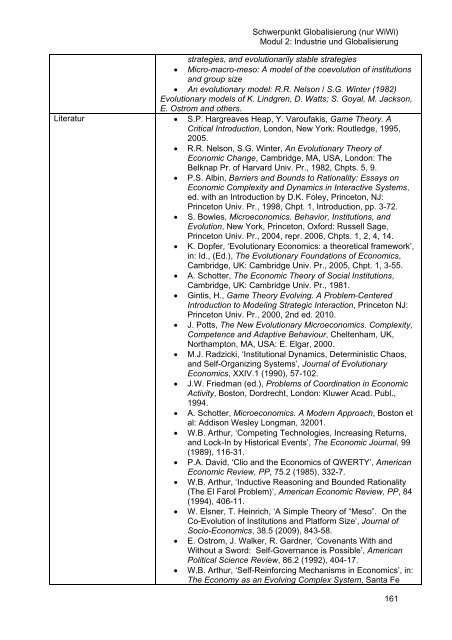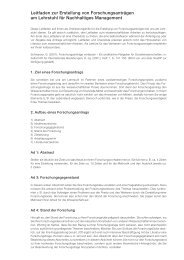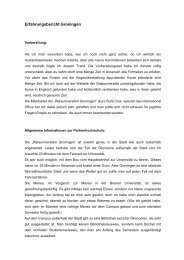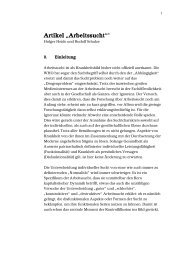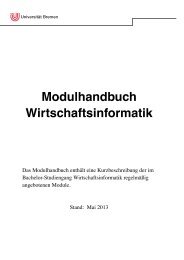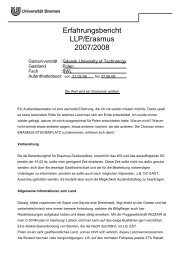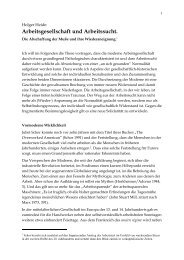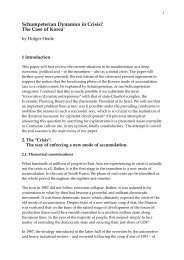Modulhandbuch BWL_WiWi.pdf - Fachbereich Wirtschaftswissenschaft
Modulhandbuch BWL_WiWi.pdf - Fachbereich Wirtschaftswissenschaft
Modulhandbuch BWL_WiWi.pdf - Fachbereich Wirtschaftswissenschaft
Sie wollen auch ein ePaper? Erhöhen Sie die Reichweite Ihrer Titel.
YUMPU macht aus Druck-PDFs automatisch weboptimierte ePaper, die Google liebt.
Schwerpunkt Globalisierung (nur <strong>WiWi</strong>)<br />
Modul 2: Industrie und Globalisierung<br />
strategies, and evolutionarily stable strategies<br />
• Micro-macro-meso: A model of the coevolution of institutions<br />
and group size<br />
• An evolutionary model: R.R. Nelson / S.G. Winter (1982)<br />
Evolutionary models of K. Lindgren, D. Watts; S. Goyal, M. Jackson,<br />
E. Ostrom and others.<br />
Literatur • S.P. Hargreaves Heap, Y. Varoufakis, Game Theory. A<br />
Critical Introduction, London, New York: Routledge, 1995,<br />
2005.<br />
• R.R. Nelson, S.G. Winter, An Evolutionary Theory of<br />
Economic Change, Cambridge, MA, USA, London: The<br />
Belknap Pr. of Harvard Univ. Pr., 1982, Chpts. 5, 9.<br />
• P.S. Albin, Barriers and Bounds to Rationality: Essays on<br />
Economic Complexity and Dynamics in Interactive Systems,<br />
ed. with an Introduction by D.K. Foley, Princeton, NJ:<br />
Princeton Univ. Pr., 1998, Chpt. 1, Introduction, pp. 3-72.<br />
• S. Bowles, Microeconomics. Behavior, Institutions, and<br />
Evolution, New York, Princeton, Oxford: Russell Sage,<br />
Princeton Univ. Pr., 2004, repr. 2006, Chpts. 1, 2, 4, 14.<br />
• K. Dopfer, ‘Evolutionary Economics: a theoretical framework’,<br />
in: Id., (Ed.), The Evolutionary Foundations of Economics,<br />
Cambridge, UK: Cambridge Univ. Pr., 2005, Chpt. 1, 3-55.<br />
• A. Schotter, The Economic Theory of Social Institutions,<br />
Cambridge, UK: Cambridge Univ. Pr., 1981.<br />
• Gintis, H., Game Theory Evolving. A Problem-Centered<br />
Introduction to Modeling Strategic Interaction, Princeton NJ:<br />
Princeton Univ. Pr., 2000, 2nd ed. 2010.<br />
• J. Potts, The New Evolutionary Microeconomics. Complexity,<br />
Competence and Adaptive Behaviour, Cheltenham, UK,<br />
Northampton, MA, USA: E. Elgar, 2000.<br />
• M.J. Radzicki, ‘Institutional Dynamics, Deterministic Chaos,<br />
and Self-Organizing Systems’, Journal of Evolutionary<br />
Economics, XXIV.1 (1990), 57-102.<br />
• J.W. Friedman (ed.), Problems of Coordination in Economic<br />
Activity, Boston, Dordrecht, London: Kluwer Acad. Publ.,<br />
1994.<br />
• A. Schotter, Microeconomics. A Modern Approach, Boston et<br />
al: Addison Wesley Longman, 32001.<br />
• W.B. Arthur, ‘Competing Technologies, Increasing Returns,<br />
and Lock-In by Historical Events’, The Economic Journal, 99<br />
(1989), 116-31.<br />
• P.A. David, ‘Clio and the Economics of QWERTY’, American<br />
Economic Review, PP, 75.2 (1985), 332-7.<br />
• W.B. Arthur, ‘Inductive Reasoning and Bounded Rationality<br />
(The El Farol Problem)’, American Economic Review, PP, 84<br />
(1994), 406-11.<br />
• W. Elsner, T. Heinrich, ‘A Simple Theory of “Meso”. On the<br />
Co-Evolution of Institutions and Platform Size’, Journal of<br />
Socio-Economics, 38.5 (2009), 843-58.<br />
• E. Ostrom, J. Walker, R. Gardner, ‘Covenants With and<br />
Without a Sword: Self-Governance is Possible’, American<br />
Political Science Review, 86.2 (1992), 404-17.<br />
• W.B. Arthur, ‘Self-Reinforcing Mechanisms in Economics’, in:<br />
The Economy as an Evolving Complex System, Santa Fe<br />
161


